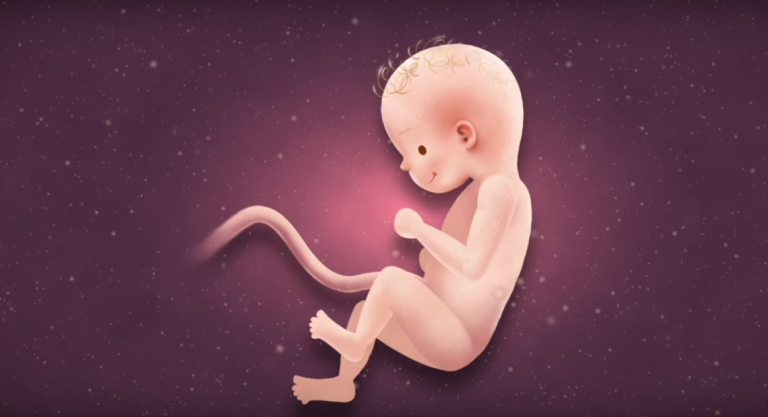You are now in the 35th week. You may be feeling more and more every day that you are getting closer to the expected end. The fact that some physical complaints have been added to the increased excitement and stress will make you say, “It should be born soon!” Your baby continues to grow and develop.
How is your baby this week? What kind of changes does the 35th week of pregnancy create for expectant mothers? We have compiled everything you can think of, from nutrition to exercise and pregnancy symptoms to a checklist.
Baby at 35 Weeks
When you reach 35 weeks, you may wonder what stage your baby’s development is. Here are the answers to all your questions, such as weight, height, development of his systems and senses, and the skills he gained…
How Big Has My Baby Got?
Your baby has grown to the size of a large pineapple this week.
Your little one gains about 200-300 grams more than last week, gaining more than 2 kilos, quickly gaining weight and gaining a chubby appearance. The subcutaneous adipose tissue thickens and prepares it for the outside world.
The weight and height of the 35-week-old baby will be approximate as in the table below:
| Gestational Age (Weeks) | Weight (g) | Length (cm) |
| Week 35 | 2200-2400 | 45-46 |
These values are the average values of a baby at 35 weeks. Many factors directly affect the height and weight of the baby in the mother’s womb. Under the doctor’s control, your little one may be overweight or thin, shorter or taller. In such cases, you should not worry and remember that such differences in the physical development of every baby are considered normal.
Development of Systems and Newly Acquired Skills
With only five weeks until birth, the development of your baby’s organs is almost complete. In this way, even if the 35-week-old baby decides to be born without waiting for the 40th week, it can quickly adapt to the outside world and survive if some precautions are taken.
So, let’s examine the 35-week-old baby’s organ and system development at what stage.
- Nervous System: Your baby’s brain development continues at full speed this week. New brain cells are formed. Nerve cells are still maturing and making innumerable connections with each other.
- The Circulatory System: The blood circulation continues to work.
- Digestive System: Livers have improved enough to break down some minor waste components this week. The sucking reflex, which is part of the digestive system, continues to develop.
- The Respiratory System: Although the respiratory system will be completed last in babies, the development of the lungs will have completed a large part of it this week. A substance called surfactant begins to be produced in the lungs, which are in the last stages of maturation. While this substance helps the baby breathe more easily, it supports the baby’s breathing by reducing the surface tension of the lungs.
- Support and Movement System: This week, the hardening process of the bones continues. Skull bones are still soft. However, compared to the previous week, the growth of the head accelerates as the brain grows. To complete this process, your baby’s calcium needs are at the highest level these days.
- Excretory System: At the 35th week, your baby’s kidneys are almost fully developed. Your baby prepares for birth by continuing to drink and discharge amniotic fluid, which significantly contributes to this development.
- Immune System: Although the immune system is not yet as strong as an adult’s, your little one continues to benefit from your antibodies and strengthen their immunity.
Movements of 35-Week-Old Baby
Baby movements this week may seem to have decreased compared to previous weeks. Your uterus grows with the baby, but by the 35th week of pregnancy, the amniotic fluid begins to fall in response to the rapidly increasing weight of the baby. The primary purpose of this situation is to create more space for the baby. For this reason, as the number of fluids decreases, the expectant mother may have difficulty feeling exceptionally light kicks and movements.
In addition, babies begin to behave like normal newborn babies during these weeks. This means your little one now spends more time sleeping and moving less. Therefore, the 35-week-old baby’s movements may seem to have decreased in number and severity in the pregnant mother.
Position of 35 Weeks Old Baby
By the 35th week, the baby in the womb gradually begins to take the birth position. During routine doctor’s examinations, it may be seen that your baby is upside down and upside down. The baby must take this position for a vaginal delivery to take place. If your little one has not turned upside down until birth, that is, if her feet or butt are in a visible position, this may not make vaginal delivery possible. Some babies take this position in the previous weeks, while others move upside down in later weeks. Therefore, you should not be alarmed right away.
Sensory Organs and Developmental Characteristics in 35 Weeks Old Baby
Your baby has almost all the abilities of a newborn baby by 35 weeks while still in the womb. She may even feel like you are sad, angry, excited, tired, or happy.
At what stage is the 35-week-old baby’s development regarding sense organs? Here are your little one’s step-by-step skills…
- Eye and Sight Sense: Your little one’s eyes will turn completely blue. The eyes, which will retain this blue colour after birth, turn to their colour after exposure to sufficient light and become coloured. The ability to see has not yet taken its final form. The power of the eyes to focus and select is not yet developed.
- Ear and Hearing Sense: Your baby’s ears are developed enough to hear even the sharpest sounds this week. In particular, he can distinguish the voices of his mother and father. Although it is in your stomach, it may react by hearing sounds coming from outside. For this reason, you can talk to him a lot and help him recognize you in your voice after he is born.
- Tongue and Taste Sense: The sucking reflex continues to develop. In this way, the sense of taste matures and distinguishes tastes after birth.
- Nose and Sense of Smell: At the 35th week of pregnancy, the development of the nose is now completed, and the sense of smell is fully developed.
- Skin and the Sense of Touch: The lanugo hairs covering his skin gradually decrease. You should not be worried as these will fall out on their own quickly. However, some babies may have lanugo hair after birth.
In addition, thanks to the increased adipose tissue, it begins to maintain its body temperature.
How Old Is A 35-Week-Old Baby?
These weeks of pregnancy herald that you should be prepared for birth now. But you may wonder how many months pregnant you are at 35th week and ask, “How many months are in 35 weeks?”
The 35th week marks your 8th month of pregnancy. You can calculate how many months pregnant you are with a simple calculation if you wish.
35 weeks = 35×7 days = 245 days
245/30= 8 months 5 days
Mom at 35th Weeks Pregnancy
For a mother who has entered the 9th month of her pregnancy, the days when physical mobility is restricted increase. The pressure exerted on the groin by your little one, who is getting heavier, increases, making it difficult to go up and down the stairs, bend over, even sleep and sit. In addition to all these, it is not surprising that some new symptoms appear.
If you are 35 weeks pregnant, let’s examine together what waits for you this week and what you should be prepared for.
- Hip and Pelvis Pain: The baby’s position in the mother’s womb and its increased weight can cause pain in the hips and pelvic region within the 35th week. Increased hormone levels due to the upcoming birth also cause pain as they try to ease the baby’s passage by stretching the bones and muscles in the pelvic region. Therefore, the complaint of hip and groin pain may have increased.
- Gum Bleeding: One of the symptoms experienced during pregnancy is gum sensitivity and bleeding in the gums. This sensitivity causes bleeding of the gums, especially when brushing your teeth. Pregnancy hormones can cause swelling in your gums while creating oedema in your body. In addition, changing diet and increased calcium needs can also trigger bleeding. However, this condition, like many other pregnancy symptoms, is temporary.
- Headache: In the 35th week of pregnancy, an increase in headaches may be felt. Not being able to find a comfortable position while sleeping, insomnia problems and tiredness cause you to experience headaches more often.
In addition to these, mood changes, stress, swelling of the nasal passages, causing congestion, and increased body temperature can also cause headaches.
- Awkwardness: During these weeks of the last trimester, the relaxed muscles of the expectant mother and her growing belly change the balance centre of her body. The changing centre of balance may prevent you from keeping your balance while bending down, walking on the road or lying down. Your enlarged stomach can cause you not to see your feet while walking, and increased fatigue can lead to loss of strength in the hands and arms – the frequency of events such as falling, staggering, or dropping something from one’s hand increases. As the clumsiness experienced by the expectant mother may increase in the last weeks, it is necessary to act more carefully from these days on.
- Oedema: Oedema is one of the most challenging symptoms for expectant mothers in recent weeks. Body fluids gradually increase, and the vessels expand as much as possible to allow passage to these fluids. However, after a certain point, the increased fluids accumulate between the tissues because there is no room left, causing swelling in certain parts of the body, especially in the hands, legs, feet, face and wrists. In addition, increased inactivity triggers this condition.
- Varicose Veins: Increased blood volume during pregnancy increases the pressure on the veins. The veins, especially in the legs, work against gravity and send blood back to the heart. This causes the veins to become bruised and swollen and appear more prominent. In the last trimester, expectant mothers may notice more obvious varicose veins, as this event is more common. Most of the varicose veins formed during pregnancy disappear after delivery.
Important Advices for Minimizing Pregnancy Symptoms
Any advice that can make life easier for a mother-to-be going through the last stages of pregnancy is of great importance. Although it is not possible to eliminate the symptoms by the 35th week of pregnancy, you can reduce your complaints by alleviating the symptoms.
Here is some practical advice for the mother at 35 weeks pregnant:
- Take small precautions to prevent possible clumsiness.
- Do not try to reach high places by climbing on a chair unless you have to.
- Choose shoes with wide soles and not high heels.
- Avoid sudden movements.
- Do simple exercises to strengthen your muscles.
- If you are experiencing bleeding gums, use toothbrushes with softer bristles and avoid strenuous movements when brushing your teeth.
- Do exercises to strengthen the pelvic floor muscles. These exercises will help you relieve increased hip pain.
- Do not forget to take a lot of walking. Daily walks will prevent oedema in your body and relieve your waist, back, hip and headaches.
- If you face oedema during these weeks, remove salt and salty foods from your diet. Excessive salt consumption increases water retention in the body. You can also remove excess oedema from your body by drinking plenty of water.
- If you are experiencing headaches at certain intervals, try to rest by taking time for yourself during the day. Get out into the fresh air if possible during this time and breathe deeply.
How Much Weight Should I Gain?
The last months of pregnancy are when expectant mothers gain the most weight. With each passing week, the baby’s weight continues to increase. The amount of water retained in the body increases. Moreover, your appetite may have risen a little more. With all of these factors combined, you may wonder how many pounds would be ideal for you to gain this week.
The weight range prescribed by doctors for 35 weeks of pregnancy is 11.5-13.5 kg. But like every pregnancy, all pregnancies are different, and you may have gained less or more of this weight. In both cases, you should not have unnecessary worries and discuss this issue with your doctor and take the necessary precautions.
Nutritional Recommendations
Nutrition at 35 weeks is as essential as in other weeks of pregnancy. Because the baby’s vitamin, mineral and protein needs reach the highest level during these weeks.
The nutritional recommendations that you can apply during this period are as follows;
- Consume foods rich in calcium, potassium and magnesium to support the baby’s muscle and bone development.
- Continue to feed little and often. Try not to starve yourself for a long time.
- In the last month of pregnancy, the iron needs of both the mother and the baby increase gradually. For this reason, always include green leafy vegetables with high iron content, red meat and meat products (provided that they are well cooked), eggs and dried legumes.
- If you can’t eat iron-rich foods and have low iron stores, talk to your doctor about taking an iron supplement.
- If your constipation and haemorrhoids problem continues, continue to consume fibrous foods.
- Avoid consuming excessive sugar, high-calorie, packaged and processed products, and control your weight yourself.
Exercise Recommendations
Exercise is essential during pregnancy. With your doctor’s approval, if there is no obstacle, you can continue to exercise during your pregnancy after the first trimester.
You can evaluate the following options as 35 weeks of pregnancy exercises and physical activities that can be done:
- Kegel exercises
- Walking
- Slow dance
- Breathing exercises and meditation
- Exercise movements that facilitate childbirth
You can prepare yourself for birth physically and psychologically by choosing exercises to improve breathing techniques during this period. If you wish, you can consult your doctor beforehand about the movements and activities you can do.
Checklist at 35 Weeks Pregnancy
- If there are deficiencies in your baby’s room, make the final preparations.
- Pack your hospital bag if it’s not ready yet.
- If you have a problem such as gestational diabetes, ensure that your fasting and postprandial sugars are controlled.
- Be sure to prepare food in your freezer for convenience after birth.
- Prepare yourself a birth plan.
The 35th week of pregnancy is one of the weeks when excitement increases. Continue to enjoy the last period of your pregnancy by dreaming of the moment when you will meet your little one, just days before the birth.
Would you like to share your experiences and questions as a comment?
Wishing you well!








I’ve read some good stuff here Definitely worth bookmarking for revisiting